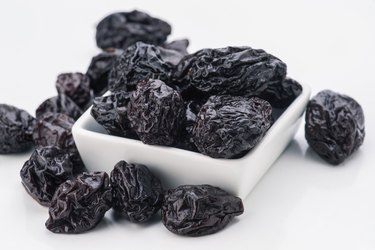
Dried fruit serves as a good, portable snack option when you are on the go. Raisins, which are dried grapes, and prunes, which are dried plums, both provide a sweet taste as well as a variety of nutrients. Both of these dehydrated fruits impart a number of health benefits and boost nutritional intake.
Calories
Video of the Day
Raisins and prunes provide calories needed for energy. One cup of raisins contains 434 calories compared to the 418 calories in a cup of prunes. As a rule, this quantity of dried fruit is too caloric to serve as a good snack. A nutritional expert with the Diet Channel suggests limiting snacks to 100 to 200 calories to ward off hunger pains; consider eating a quarter- or half-cup serving of prunes or raisins as appropriate for your diet.
Video of the Day
Fiber
The fiber in your diet positively influences bowel health and digestion. You get fiber from both raisins and prunes. One cup of raisins introduces 5.4 grams of fiber into your diet, while a cup of prunes contains 12.4 grams. The daily recommended intake of fiber stands at 25 grams daily for adult women and 38 grams for adult men. Prunes give you the most fiber bang for your buck.
Potassium
You can eat both raisins and prunes to boost your potassium level. A 1-cup serving of raisins contains 1,086 milligrams potassium, and 1 cup of prunes has 1,274 milligrams. The amount of potassium you need each day is 2,000 mg, so either dried fruit meets approximately half your daily requirements. The potassium in raisins and prunes helps maintain the chemical balance of your blood as well as fluid levels in the body.
Vitamin K
Prunes are the winner when it comes to vitamin K content. A cup of prunes contains 103.5 micrograms of vitamin K, compared to the 5.1 micrograms in a cup of raisins. You require 90 to 125 micrograms of vitamin K each day to help your blood clot. The vitamin K abundant in prunes also plays a role in bone health; getting adequate amounts may help prevent osteoporosis.
Copper
Both raisins and prunes provide you with copper. They each contain approximately 0.5 milligrams per 1-cup serving. The copper available in these dried fruits helps produce hemoglobin, and it also helps improve the quality of your skin by promoting the production of a skin compound known as elastin. Try to include 0.9 milligrams of copper in your diet each day.
- USDA National Nutrient Database: Plums, Dried (Prunes), Uncooked
- USDA National Nutrient Database: Raisins, Seedless
- The Diet Channel: Calories: What's an Ideal Daily Intake?
- Colorado State University Extension: Dietary Fiber
- University of Maryland Medical Center: Potassium
- University of Maryland Medical Center: Vitamin K
- University of Maryland Medical Center: Copper